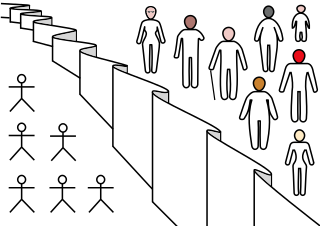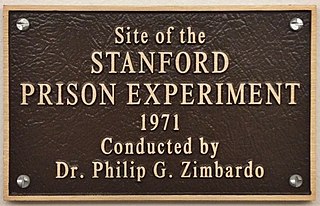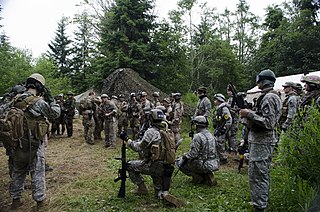
A live action role-playing game (LARP) is a form of role-playing game where the participants physically portray their characters. The players pursue goals within a fictional setting represented by real-world environments while interacting with each other in character. The outcome of player actions may be mediated by game rules or determined by consensus among players. Event arrangers called gamemasters decide the setting and rules to be used and facilitate play.

A simulation is the imitation of the operation of a real-world process or system over time. Simulations require the use of models; the model represents the key characteristics or behaviors of the selected system or process, whereas the simulation represents the evolution of the model over time. Often, computers are used to execute the simulation.
Confirmation bias is the tendency to search for, interpret, favor, and recall information in a way that confirms or supports one's prior beliefs or values. People display this bias when they select information that supports their views, ignoring contrary information, or when they interpret ambiguous evidence as supporting their existing attitudes. The effect is strongest for desired outcomes, for emotionally charged issues, and for deeply entrenched beliefs. Confirmation bias cannot be eliminated, but it can be managed, for example, by education and training in critical thinking skills.

The original position (OP), often referred to as the veil of ignorance, is a thought experiment used for reasoning about the principles that should structure a society based on mutual dependence. The phrases original position and veil of ignorance were coined by the American philosopher John Rawls, but the thought experiment itself was developed by William Vickrey and John Harsanyi in earlier writings.

A social movement is a loosely organized effort by a large group of people to achieve a particular goal, typically a social or political one. This may be to carry out a social change, or to resist or undo one. It is a type of group action and may involve individuals, organizations, or both. Social movements have been described as "organizational structures and strategies that may empower oppressed populations to mount effective challenges and resist the more powerful and advantaged elites". They represent a method of social change from the bottom within nations.

The simulation theory is the hypothesis that reality could be simulated—for example by quantum computer simulation—to a degree indistinguishable from "true" reality. It could contain conscious minds that may or may not know that they live inside a simulation. This is quite different from the current, technologically achievable concept of virtual reality, which is easily distinguished from the experience of actuality. Simulated reality, by contrast, would be hard or impossible to separate from "true" reality. There has been much debate over this topic, ranging from philosophical discourse to practical applications in computing.

The Stanford prison experiment (SPE) was a psychological experiment conducted in the summer of 1971. It was a two-week simulation of a prison environment that examined the effects of situational variables on participants' reactions and behaviors. Stanford University psychology professor Philip Zimbardo led the research team who administered the study.
New media is described as communication technologies that enable or enhance interaction between users as well as interaction between users and content. In the middle of the 1990s, the phrase "new media" became widely used as part of a sales pitch for the influx of interactive CD-ROMs for entertainment and education. The new media technologies, sometimes known as Web 2.0, include a wide range of web-related communication tools such as blogs, wikis, online social networking, virtual worlds, and other social media platforms.
Social simulation is a research field that applies computational methods to study issues in the social sciences. The issues explored include problems in computational law, psychology, organizational behavior, sociology, political science, economics, anthropology, geography, engineering, archaeology and linguistics.

The American Sociological Association (ASA) is a non-profit organization dedicated to advancing the discipline and profession of sociology. Founded in December 1905 as the American Sociological Society at Johns Hopkins University by a group of fifty people, the first president of the association would be Lester Frank Ward. Today, most of its members work in academia, while around 20 percent of them work in government, business, or non-profit organizations.
Contentious politics is the use of disruptive techniques to make a political point, or to change government policy. Examples of such techniques are actions that disturb the normal activities of society such as demonstrations, general strike action, direct action, riot, terrorism, civil disobedience, and even revolution or insurrection. Social movements often engage in contentious politics. The concept distinguishes these forms of contention from the everyday acts of resistance explored by James C. Scott, interstate warfare, and forms of contention employed entirely within institutional settings, such as elections or sports. Historical sociologist Charles Tilly defines contentious politics as "interactions in which actors make claims bearing on someone else's interest, in which governments appear either as targets, initiators of claims, or third parties."

Social movement theory is an interdisciplinary study within the social sciences that generally seeks to explain why social mobilization occurs, the forms under which it manifests, as well as potential social, cultural, political, and economic consequences, such as the creation and functioning of social movements.
William Anthony Gamson was a professor of Sociology at Boston College, where he was also the co-director of the Media Research and Action Project (MRAP). He is the author of numerous books and articles on political discourse, the mass-media and social movements from as early as the 1960s. His influential works include Power and Discontent (1968), The Strategy of Social Protest (1975), Encounters with Unjust Authority (1982) and Talking Politics (2002), as well as numerous editions of SIMSOC.

MilSim, an abbreviation of military simulation, refers to live-acted simulation of armed conflict scenarios conducted by civilians for entertainment, sporting or nostalgic purposes. It has been described as both a form of "extreme sport" and as historical reenactment.
David Gamson is an American keyboardist/musician. Originally hailing from New York, he has worked with, among others, Kesha, Kelly Clarkson, Jessie J, Adam Lambert, Chaka Khan, Charli XCX, Meshell Ndegeocello, Green Gartside, Sheila E., George Benson, Luther Vandross, Donny Osmond, Miles Davis, Al Jarreau, Tony LeMans, Roger Troutman and Eden XO.

Geoffrey Nigel Gilbert is a British sociologist and a pioneer in the use of agent-based models in the social sciences. He is the founder and director of the Centre for Research in Social Simulation, author of several books on computational social science, social simulation and social research and past editor of the Journal of Artificial Societies and Social Simulation (JASSS), the leading journal in the field.

The Justice Party is a centre-left to left-wing political party in South Korea. It has been placed as liberal, progressive, and social democratic. It was founded on 21 October 2012 when it split from moderates of the Unified Progressive Party. The Justice Party now takes a more moderate stance than the United Progressive Party or the Democratic Labor Party in the past.

Social movement impact theory is a subcategory of social movement theory, and focuses on assessing the impacts that social movements have on society, as well as what factors might have led to those effects.
The Charles Tilly Award for Best Book is given by the Collective Behavior and Social Movements section of the American Sociological Association in recognition of a significant contribution to the field. Nominees of the award are regarded as being representative of the "best new books in the field of social movements." The award was established in 1986 and is named after sociologist Charles Tilly.

A critical theory is any approach to social philosophy that focuses on society and culture to reveal, critique and challenge power structures. With roots in sociology and literary criticism, it argues that social problems stem more from social structures and cultural assumptions than from individuals. It argues that ideology is the principal obstacle to human liberation. Critical theory finds applications in various fields of study, including psychoanalysis, sociology, history, communication theory, philosophy and feminist theory.











